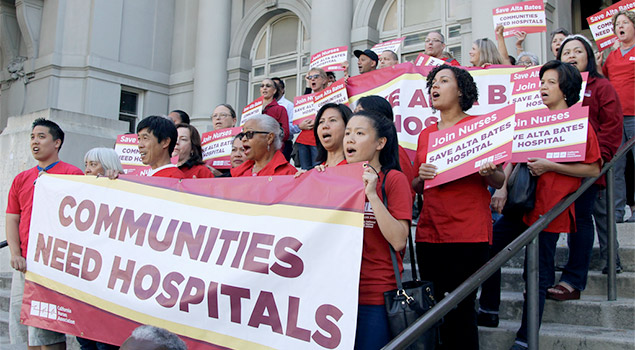Press Release
Nurses Hold Town Hall to Say, 'Keep Alta Bates Hospital Open!'

RNs, Community Speak Out on Dire Health Consequences of Losing Alta Bates
On Wednesday, September 21, nurses, local leaders and community members will hold a town hall meeting in Berkeley on the negative health impact of Sutter’s intention to close Alta Bates hospital by as early as 2018, the California Nurses Association (CNA) announced today.
“Nurses know very well that the closure of Alta Bates would present a dire risk to patients in this community by leaving them with a dearth of lifesaving services,” said Martha Kuhl, RN, California Nurses Association Treasurer. “That’s why we will be uniting with community leaders on Wednesday to help local residents understand Sutter’s plans, what’s at stake—and why we must fight to keep the hospital open.”
WHAT: Nurses Town Hall on Why Communities Deserve Hospitals
WHEN: Wednesday, Sept. 21, 2016 – 4-7 p.m.
WHERE: Ed Roberts Campus Atrium, 3075 Adeline Street, Berkeley, CA 94703
Sutter says it will maintain only doctors’ offices and potentially an “urgent care center” in Berkeley. But a broad range of vital patient services cannot be treated at an urgent care center, including heart attacks, strokes, seizures, internal bleeding, most burns, life threatening allergic reactions, poisoning, electrical shock, and severe abdominal pain, head and back injuries, and bone breaks.
Patients needing true emergency care would need to be rushed to a full service hospital, such as Sutter’s Alta Bates Summit Medical Center in Oakland, from Berkeley along heavily trafficked roads that can result in delays of up to 90 minutes or longer depending on ambulance and transport staff availability. Additionally, first responders are then removed for longer periods of time for other patient care needs.
Town Hall speakers will include: CNA Director of Health & Safety Bonnie Castillo; CNA Treasurer Martha Kuhl, RN; Alta Bates Neonatal Intensive Care Unit nurse and El Cerrito City Council candidate Rochelle Pardue-Okimoto; California Assemblymember Tony Thurman; California Assemblymember Rob Bonta; Berkeley mayoral candidate Jessie Arreguin; and former Berkeley mayor Gus Newport. Supporting organizations include the East Bay Alliance for a Sustainable Economy (EBASE), Faith in Alliance for a Moral Economy (FAME), Alliance of Californians for Community Empowerment (ACCE), Jobs With Justice (JWJ), and Richmond Progressive Alliance (RPA).
Critical points covered by the panel will include:
- Loss of emergency services. With the closure of San Pablo’s Doctors Medical Center in 2015, surrounding hospitals have struggled to care for additional patients. Summit is already experiencing massive waits in the Emergency Room, sometimes 2-3 days, say nurses. Because urgent care centers do not treat true emergencies, nurses say the void in emergency services from Vallejo to Oakland would put patients at risk.
“Patients who visit an urgent care center in Berkeley with what turns out to be a heart attack or a stroke would now face not only the delay of having to be transferred by ambulance, but also the delay of having wasted valuable time visiting an urgent care center, when what they needed was a full service hospital,” said RN Mike Hill, who has worked in the Summit ICU for 30 years.
“Time is life. If you run out of time, a patient is dead. Simple as that. What Sutter is proposing is playing Russian roulette with the community.”
- Inability of surrounding hospitals to absorb additional patients. With the closure of Doctors Medical Center, data from the California Office of Statewide Health Planning and Development (OSHPD) shows that Alta Bates’ patient census days (the number of days that inpatients are hospitalized) rose from 93,725 in 2014 to 147,569 in 2015—a difference of nearly 54,000.
Nurses say this increase doesn’t even account for patients in “observation status”—an overused classification that has historically allowed hospitals to cut corners on staffing and other protections (addressed by SB1076, a bill currently waiting to be signed into law). RNs say the number of patients served by Alta Bates is actually higher when factoring in observation patients—a cumulative total that could not possibly be handled at surrounding hospitals like Oakland’s Summit.
“Our ER at Summit is already so busy, and it’s so important, especially with heart patients like mine, to keep them moving through and on into the rest of the hospital quickly,” said Stephanie Patten, RN, a Cardiac Telemetry nurse at Summit. “Alta Bates sees around 300 ER patients per day. The ER you would have to build at Summit to handle that load would be enormous. We keep asking Sutter what their plans are, and they don’t have an answer.”
- Consolidation leading to a loss of services. Nurses say a precedent has already been set with the merger of Alta Bates hospital and Summit Medical Center in 2000, when Alta Bates Summit lost many critical services—despite Sutter’s insistence that services would be enhanced.
“We can’t afford to lose the quality of care patients rely on in this community,” said Kuhl. “We are coming together on Wednesday to discuss all of the risks associated with Sutter’s plan to close Alta Bates, to help the community understand what’s happening. As nurses, it’s our job to advocate for our patients, and we are standing up to say we will never stop fighting for the health and safety of our community.”
California Nurses Association represents nearly 100,000 registered nurses statewide.